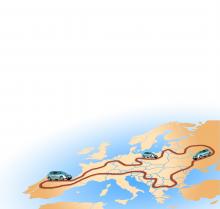Leaked confidential documents from a committee of senior European Union police officers indicate that the EU is developing a ‘remote stopping’ device that would be fitted to all cars and allow police to disable vehicles at the flick of a switch as part of wider law enforcement surveillance and tracking measures.
According to the documents, the project will work on a technological solution that can be a 'build in standard' for all cars that enter the European market and is aimed at bringing dangerous hig
Leaked confidential documents from a committee of senior 1816 European Union police officers indicate that the EU is developing a ‘remote stopping’ device that would be fitted to all cars and allow police to disable vehicles at the flick of a switch as part of wider law enforcement surveillance and tracking measures.
According to the documents, the project will work on a technological solution that can be a 'build in standard' for all cars that enter the European market and is aimed at bringing dangerous high-speed car chases to an end and to make redundant techniques such as spiking tyres.
The devices, which could be in all new cars by the end of the decade, would be activated by a police officer working from a computer in a central control room. Once enabled, the suspect vehicle's fuel supply would be cut and the ignition switched off, bringing it to a halt.
Statewatch, a watchdog monitoring police powers, state surveillance and civil liberties in the EU, has leaked the documents amid concerns that the technology poses a serious threat to civil liberties. "Let's have some evidence that this is a problem, and then let's have some guidelines on how this would be used," said Tony Bunyan, the director of Statewatch.
According to news reports, Douglas Carswell, a Conservative MP, said the plan threatened civil liberties and bypassed parliament. Nigel Farage, the leader of Ukip, said the measure was "incredible" and a "draconian imposition". "It is appalling they are even thinking of it," he said.
Enlets argues the technology's merits. "Cars on the run can be dangerous for citizens," a document states. "Criminal offenders will take risks to escape after a crime. In most cases the police are unable to chase the criminal due to a lack of efficient means to stop the vehicle safely."
According to the documents, the project will work on a technological solution that can be a 'build in standard' for all cars that enter the European market and is aimed at bringing dangerous high-speed car chases to an end and to make redundant techniques such as spiking tyres.
The devices, which could be in all new cars by the end of the decade, would be activated by a police officer working from a computer in a central control room. Once enabled, the suspect vehicle's fuel supply would be cut and the ignition switched off, bringing it to a halt.
Statewatch, a watchdog monitoring police powers, state surveillance and civil liberties in the EU, has leaked the documents amid concerns that the technology poses a serious threat to civil liberties. "Let's have some evidence that this is a problem, and then let's have some guidelines on how this would be used," said Tony Bunyan, the director of Statewatch.
According to news reports, Douglas Carswell, a Conservative MP, said the plan threatened civil liberties and bypassed parliament. Nigel Farage, the leader of Ukip, said the measure was "incredible" and a "draconian imposition". "It is appalling they are even thinking of it," he said.
Enlets argues the technology's merits. "Cars on the run can be dangerous for citizens," a document states. "Criminal offenders will take risks to escape after a crime. In most cases the police are unable to chase the criminal due to a lack of efficient means to stop the vehicle safely."







